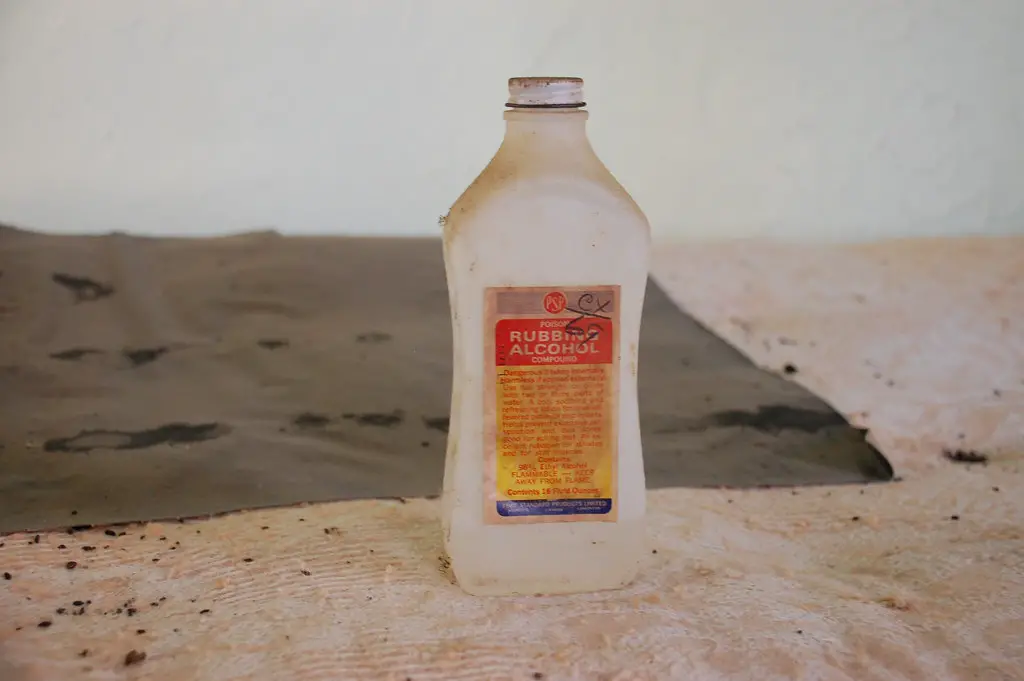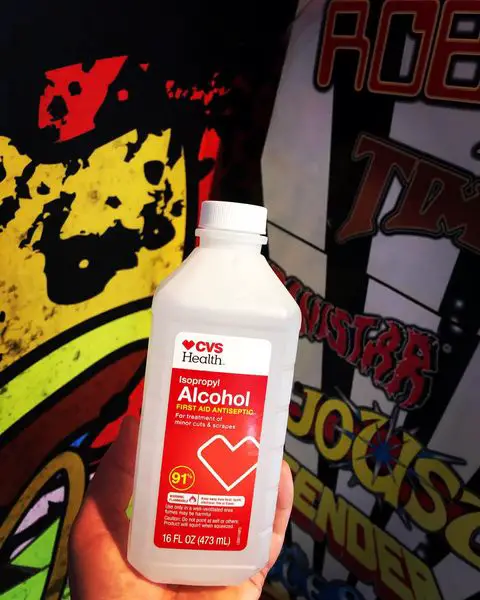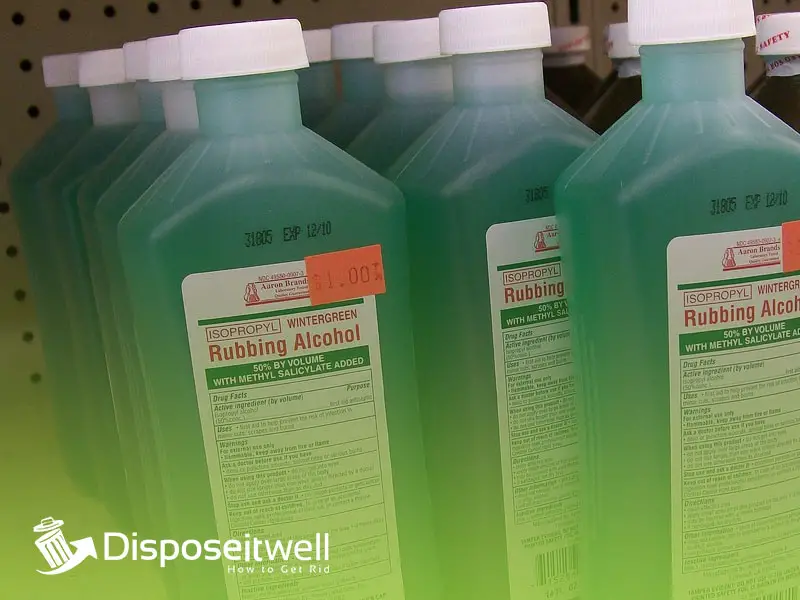Are you wondering how to safely dispose of rubbing alcohol? Whether you’re using it for medical purposes or cleaning, it’s important to know the proper way to get rid of rubbing alcohol.
Rubbing alcohol is a substance that is used for a variety of purposes, ranging from cleaning and disinfecting surfaces to treating wounds and even eliminating odors. It has a strong odor and is usually found in a variety of forms, including liquid and gel. The importance of rubbing alcohol can be seen by the fact that in 2021, the worldwide isopropyl alcohol market was estimated at over US$ 4 billion.
In this article, we will explore the best methods for safely disposing of rubbing alcohol, so you can make sure that your home and environment remain safe and healthy. Read on to find out how to dispose of rubbing alcohol safely and responsibly.
Is Rubbing Alcohol A Hazardous Waste?
Yes, rubbing alcohol is a hazardous waste. It is a toxic substance that can have a variety of negative health effects. It is classified as a “list” hazardous waste by the U.S. Environmental Protection Agency (EPA) and is subject to federal regulations. Rubbing alcohol has been linked to cancer, chronic health effects, and reproductive effects.
Studies have shown that long-term exposure to rubbing alcohol can increase the risk of cancer, and exposure to high levels of rubbing alcohol can cause permanent damage to the kidneys, liver, and brain. Additionally, exposure to rubbing alcohol during pregnancy can cause damage to the fetus.
In addition, exposure to rubbing alcohol can cause acute health effects such as skin burns and eye irritation. Short-term exposure can cause skin rash, itching, and dryness. Inhalation of rubbing alcohol vapors can cause dizziness, headache, and nausea. Therefore, rubbing alcohol should be handled with care and always be stored and used in a well-ventilated area. You can see the hazards of rubbing alcohol in detail in this study.
Why should you dispose of rubbing alcohol?
Despite its highly flammable nature, rubbing alcohol can cause serious skin burns if it comes into contact with the skin. When rubbing alcohol vapors are inhaled, they can cause irritation to the respiratory tract and can lead to serious health complications.
Additionally, when it is disposed of improperly, it can contaminate the soil, groundwater, and surface waters, leading to ecological damage. For these reasons, it is important to properly dispose of rubbing alcohol in order to protect both human health and the environment.

Safety precautions to take while disposing of rubbing alcohol:
Safety precautions while disposing of rubbing alcohol should always be taken.
1. Storage: Rubbish alcohol should be stored in a sealed container. As a result, it won’t spill and create a potential fire hazard. The container should also be kept away from any heat sources, such as stoves or hot water heaters.
2. Avoid Open Flames: Rubbing alcohol is highly flammable. Keep it away from open flames, matches, and lighters. Fires can be prevented by doing this.
3. Safety Gear: When handling rubbing alcohol, it is important to wear protective gear such as gloves, goggles, and a face shield. This will help protect your skin and eyes from any splashes or spills. Additionally, it is important to make sure that the area is well-ventilated to reduce the risk of inhalation.
How To Dispose Of Rubbing Alcohol?
Proper disposal of rubbing alcohol is important to prevent contamination of the environment and potential harm to human health. There are several safe methods for disposing of rubbing alcohol, let’s see some of them

1. Pouring it down the drain:
The disposal of rubbing alcohol can be done by draining it down the sink. Before doing this, it is important to add water to the alcohol to dilute it and make it thinner. This will help to break down the chemical structure of the alcohol, making it less likely to cause any damage or harm to the environment.
Once the alcohol has been diluted, it can be drained down the sink. It is important to run the water for at least 40-50 seconds after draining the alcohol, as this will ensure that any remaining alcohol is diluted further and can no longer cause any damage.
To dispose of rubbing alcohol, it is important to not pour it directly onto the ground, as this can cause environmental damage from the alcohol leaking into the soil or groundwater. Never pour rubbing alcohol directly into the sink without first diluting it with water, as this can cause damage to the pipes and even create an explosive reaction.
2. Contact the nearest local hazardous waste disposal facility:
Depending on the local regulations, if you wish to dispose of rubbing alcohol, you will need to do so through a hazardous waste disposal facility depending on the local regulations. Generally, the facility will require you to contact them in advance to discuss the type and amount of material to be disposed of and to make an appointment for them to come out and collect it.
Upon arrival, the facility will provide you with appropriate containers for the material and instruct you on how to properly package and label the alcohol for safe transport. Once the material is packaged, the facility will transport it to a recycling or disposal facility for proper disposal. Depending on the regulations, you may also be asked to provide documentation of the disposal. You can see the hazardous waste disposal center online here.
3. Contact your local waste management authority:
For disposing of rubbing alcohol, you can get in touch with your local waste management company to find out the best way to dispose of it responsibly. Depending on the area, your local authority may have a special drop-off place or collection point where you can take your rubbing alcohol to be disposed of safely.
Alternatively, they may provide a specific collection service where they will come to collect the alcohol and take it away for disposal. It is important to make sure to contact the right department as disposing of rubbing alcohol improperly can be hazardous to the environment and to people.
4. Give it away:
If you have a large quantity of rubbing alcohol that you need to dispose of, one good option is to give it away to someone who will use it properly. You can donate it to a healthcare facility, such as a hospital, clinic, or nursing home, that can use it for medical purposes. You can also donate it to a charity that provides care for people, such as a soup kitchen or homeless shelter, as they may be able to use it for disinfecting surfaces and objects.
Make sure the organization is aware of the potential hazards of using and storing rubbing alcohol, and is prepared to handle it properly.
5. Selling it:
When it comes to disposing of rubbing alcohol, selling it to local pharmacies, laboratories, or medical facilities is one of the best routes to take. Rubbing alcohol is a widely used antiseptic and disinfectant, and as such, it’s important to dispose of it in a responsible and safe manner.
If you plan to sell rubbing alcohol, it’s important to remember that it must be sold to a reputable facility that has the necessary safety protocols in place to properly store and use the product. This means that if you’re selling rubbing alcohol to a pharmacy, laboratory, or medical facility, the facility must have a valid license to sell, store, and use rubbing alcohol.
6. Use it:
Rubbing alcohol is an incredibly useful and versatile cleaning agent. It not only disinfects and sanitizes surfaces, but it can also be used to clean and remove stubborn smells. Whether it’s the smell of gasoline from your hands, urine from the bathroom, or streaks from your windows, rubbing alcohol is often the go-to solution for getting rid of unwanted odors and dirt. We will discuss them in detail in the recycling part.
7. Put it in the trash bin in a labeled and sealed container:
If you can’t find a hazardous waste collection center or a pharmacy or any other option that will accept rubbing alcohol, then the last option is to throw it away in a labeled and sealed container. This is the least preferred method of disposal, but it is better than leaving it in an unlocked and unsealed container.
When disposing of rubbing alcohol through the trash, it’s important to label the container. You should include the name of the product, the date of disposal, and the words “caution – hazardous material”. This will alert anyone who comes across the container that it contains hazardous material and should not be handled without proper protective gear.
It’s also important to seal the container. Rubbing alcohol should not be left exposed to air because it is flammable. A tightly sealed container will help prevent any accidental fires or explosions.
Is Isopropyl Alcohol recyclable?
The answer is a resounding yes! When it comes to recycling, isopropyl alcohol is one of the most versatile substances out there. It can be recycled in a number of ways, depending on its form and the type of product it is used in.
How to recycle Isopropyl Alcohol?
Isopropyl can be recycled in the following ways:
1. Use as an insecticide:
Using isopropyl alcohol as an insecticide is a safe and effective way to recycle isopropyl alcohol. Isopropyl alcohol has many insecticidal properties, such as killing soft-bodied insects, and it can be used to make a solution for treating a variety of pests.
To make a pesticide solution, mix 2 teaspoons of isopropyl alcohol with 1 quart of warm water. For harder-bodied insects, use a higher concentration of isopropyl alcohol and water. Apply the solution with a spray bottle or directly onto the insects.
2. Household cleaner:
You can use isopropyl alcohol as a household cleaner because it is a great cleaning agent. Besides cleaning windows, mirrors, and glass, it is also a powerful degreaser. Also great for removing grime and dirt from appliances, countertops, and other surfaces.
Isopropyl alcohol can also be used to clean bathrooms, kitchens, and other areas in the home. Isopropyl alcohol can also be used to remove stubborn stains, such as coffee and tea stains. Additionally, it can be used to clean and freshen carpets and rugs.
3. Homemade Disinfectant:
Isopropyl alcohol is an effective and inexpensive disinfectant. It is commonly found in households and businesses, but it can also be recycled in order to create a homemade disinfectant.
To make a homemade disinfectant, simply combine one part isopropyl alcohol with one part water in a spray bottle. Shake well to combine, and spray onto any hard surface you wish to disinfect. This homemade disinfectant can be used in areas where store-bought disinfectants are not available or cost prohibitive.
4. Makeup cleaner:
Isopropyl alcohol’s main component is propanol, which is an effective solvent for oil-based makeup products and can be used to quickly clean and disinfect makeup brushes and other applicators.
Some people also use isopropyl alcohol as an ingredient in their homemade makeup remover recipes. Isopropyl alcohol is a great option for cleaning makeup products because it evaporates quickly and leaves no residue behind.
5. Metal cleaning:
Jewelry and silverware can be cleaned with isopropyl alcohol. The alcohol is used to dissolve dirt, grease, and oil from metal surfaces. Isopropyl alcohol can be applied directly to the metal surface with a cloth or can be used in diluted form with water. The metal should be completely dry before storage.
Can Isopropyl Alcohol go down the drain?

Yes, by diluting you can make it less harmful, Isopropyl Alcohol can go down the drain. However, it is best to pour it in small amounts and not in large quantities as it can damage the pipes. The detail about alcohol draining is given above in disposal methods.
What to do with expired Isopropyl Alcohol?
It is not recommended to use expired isopropyl alcohol for medical purposes, since it may not be as effective at killing germs. Although it may still contain some isopropanol, the percentage of isopropanol will be lower than when it was fresh. As a result, germs and other organisms won’t be killed as effectively. In general, you can still use it to wipe down surfaces or clean your hands, but it won’t be as effective as before.
While expired rubbing alcohol may remove some germs, it won’t be as effective as fresh rubbing alcohol. It is not recommended to use expired rubbing alcohol on your skin, because it can pose risks. Alcohol may be too harsh for your skin, causing irritation or drying. The use of expired rubbing alcohol to clean your skin is therefore not safe.
FAQs
Does rubbing alcohol evaporate?
Yes, rubbing alcohol does evaporate. Depending on the type of rubbing alcohol and the conditions in which it is stored, it can take anywhere from 2-3 years before it begins to evaporate. In general, rubbing alcohol should be stored in a cool, dark place away from direct sunlight and sources of heat to ensure optimal shelf life.
Can you get drunk from Rubbing Alcohol?
Yes, it is possible to get drunk from rubbing alcohol. The effects of rubbing alcohol can be intense and can be felt within an hour of ingestion. However, this is extremely dangerous and should never be done. Rubbing alcohol is highly toxic and can be fatal if ingested in large amounts.
What happens if you rub Alcohol in the eye?
If you rub alcohol in your eye, it can cause serious damage to your eye tissue and result in painful burns on the cornea, and the exterior of the eye. The burn can cause redness, swelling, blurred vision, and even loss of vision. If you experience any of these symptoms, you should seek immediate medical attention.
Is Rubbing Alcohol Safe For Septic Tanks?
No, rubbing alcohol is not safe for septic tanks. It is important to keep rubbing alcohol away from your septic system because it can cause damage to the septic tank and the components of the system. Rubbing alcohol can also kill the beneficial bacteria in the septic tank that helps break down waste.
Does Isopropyl Alcohol Expire?
Yes, isopropyl alcohol expires. It has a shelf life of two to three years, depending on concentration and storage conditions.
Conclusion
Isopropyl alcohol is a multi-purpose and versatile product. It can be used as an effective cleaner, degreaser, disinfectant, and even metal cleaner. The disposal of the isopropyl alcohol should be done with care, as it can damage pipes and septic systems. Additionally, expired isopropyl alcohol should not be used on your skin due to its decreased efficacy. Overall, Isopropyl alcohol can be a great way to keep your home and surfaces clean and disinfected!

Gemma Alexander has an M.S. in urban horticulture and a backyard filled with native plants. After working in a genetics laboratory and at a landfill, she now writes about the environment and recycling topics.


2 thoughts on “How To Dispose Of Rubbing Alcohol”